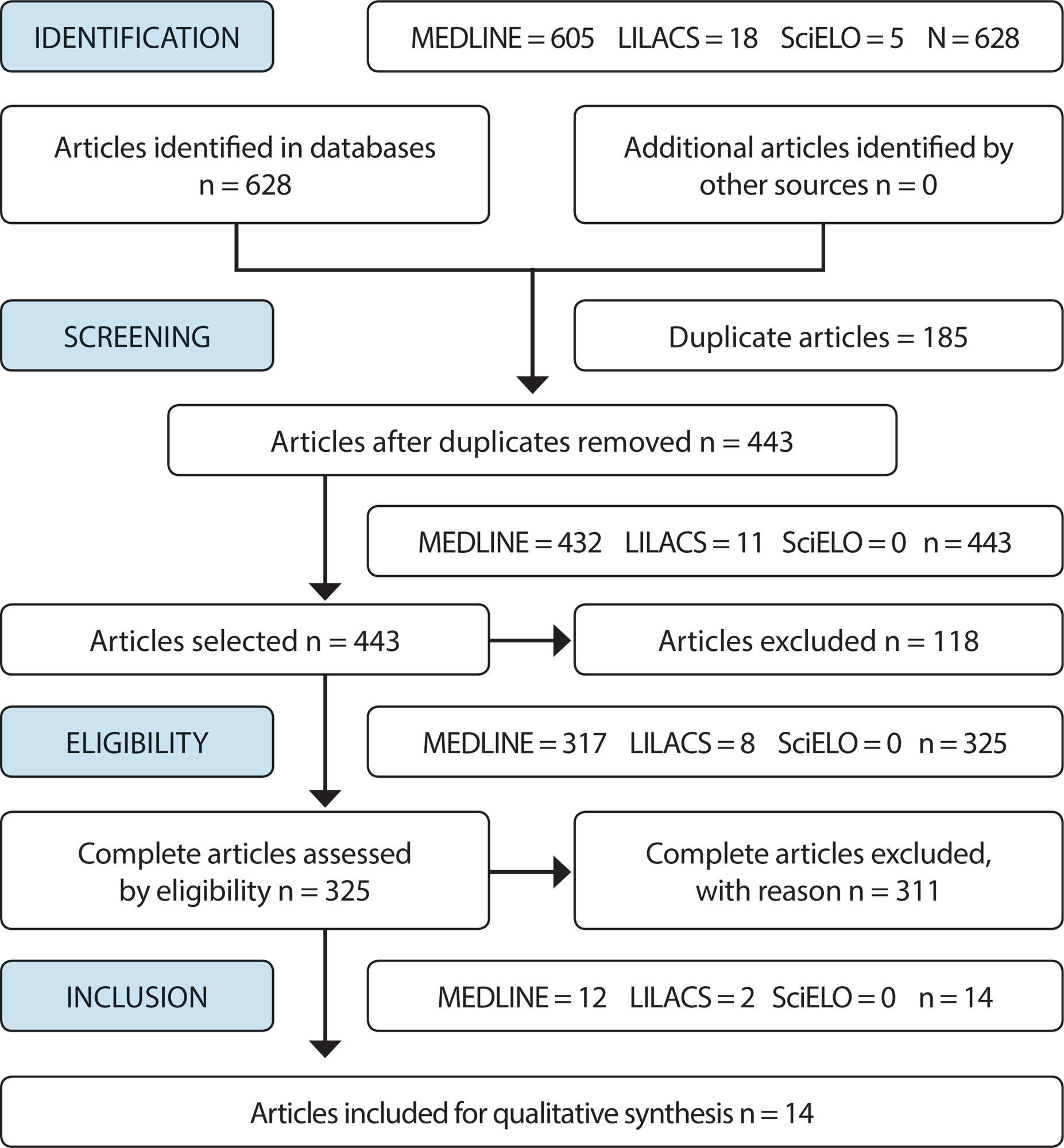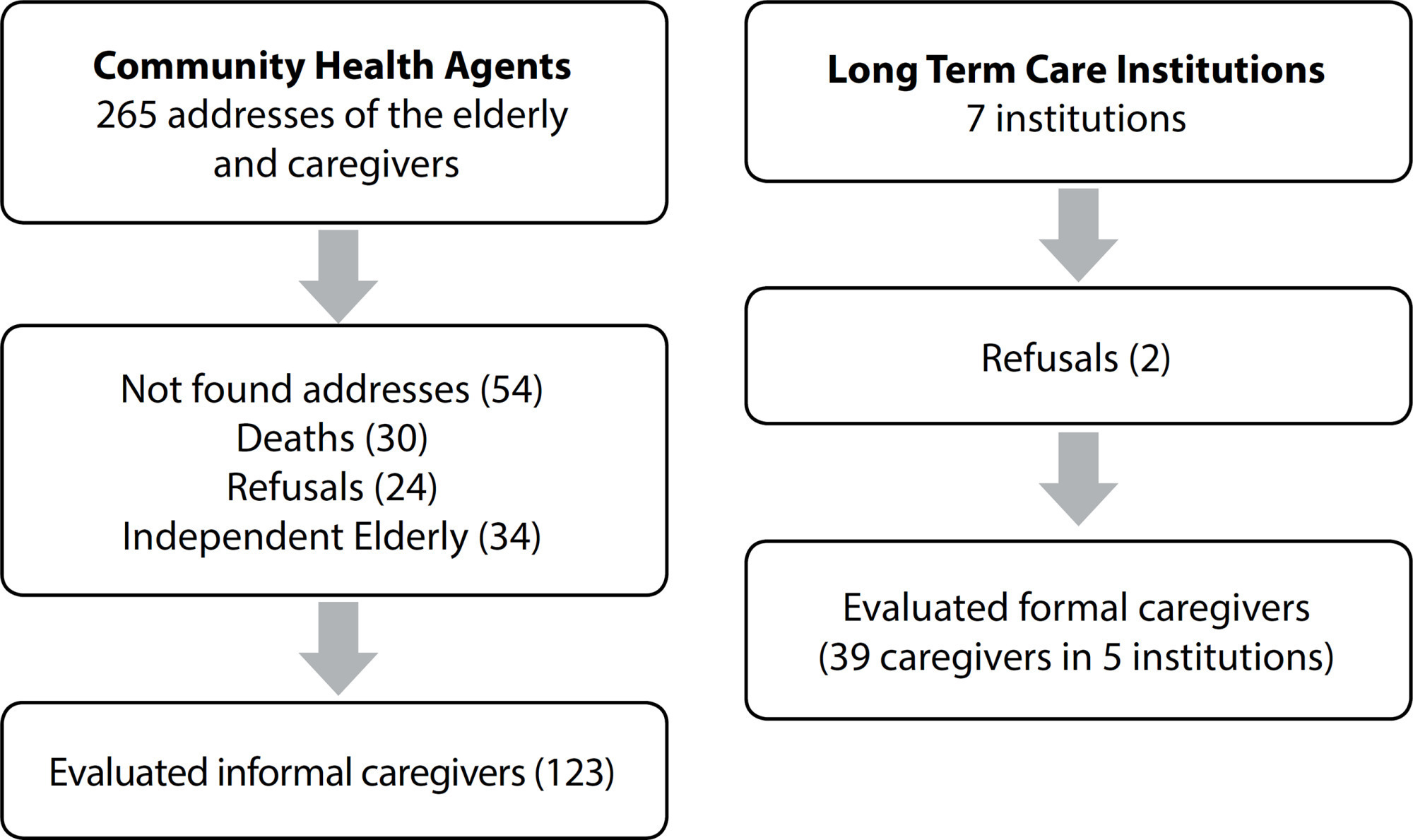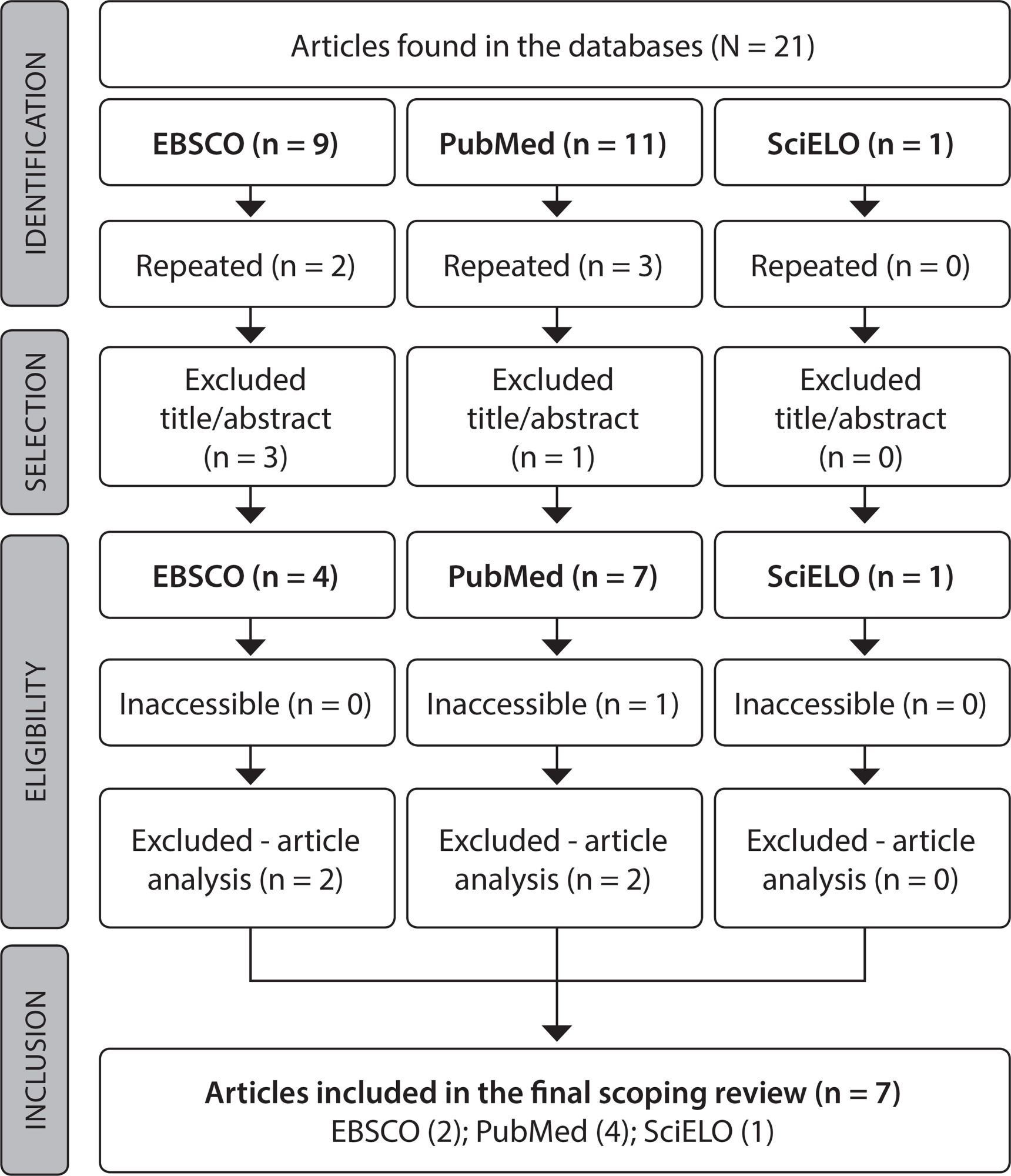-
ERRATUM01-15-2024
ERRATUM
Revista Brasileira de Enfermagem. 2024;77(1):e2024n1e01
Abstract
ERRATUMERRATUM
Revista Brasileira de Enfermagem. 2024;77(1):e2024n1e01
DOI 10.1590/0034-7167.20247701e01
Views3In the article “The ethics of nursing care for transgender people”, with DOI number: , published in Revista Brasileira de Enfermagem, 2023;76(Suppl 3):e20220797, in authorship: Where it read: […]See more -
01-15-2024
ERRATA
Revista Brasileira de Enfermagem. 2024;77(1):e2024n1e01
Abstract
ERRATA
Revista Brasileira de Enfermagem. 2024;77(1):e2024n1e01
DOI 10.1590/0034-7167.20247701e01
Views1En el artículo “La ética del cuidado de enfermería para personas transgénero”, con número DOI: , publicado en la Revista Brasileira de Enfermagem, 2023;76( Suppl 3):e20220797, en autoría:Onde se lia:[…]See more -
ORIGINAL ARTICLE01-13-2024
Knowledge, Attitudes, and Practices of nurses regarding blood culture collection
Revista Brasileira de Enfermagem. 2024;77(6):e20230424
Abstract
ORIGINAL ARTICLEKnowledge, Attitudes, and Practices of nurses regarding blood culture collection
Revista Brasileira de Enfermagem. 2024;77(6):e20230424
DOI 10.1590/0034-7167-2023-0424
Views2See moreABSTRACT
Objectives:
to investigate the knowledge, attitudes, and practices of nurses regarding blood culture collection.
Methods:
a cross-sectional study was conducted in five Brazilian public hospitals with 112 nurses. Data were collected using an adapted questionnaire and analyzed through descriptive and inferential statistics.
Results:
nurses who did not consider themselves capable of collecting blood cultures had a 72% lower chance of performing the collection at the recommended site and an 83% lower chance of using the same needle for blood inoculation into the vials. Nurses working in the emergency department had a 75% lower chance of knowing the international benchmark for blood culture contamination rates, and those with less than 5 years in the position decreased their chance of accuracy in this matter by 79%.
Conclusions:
there are gaps in the knowledge, attitudes, and practices of nurses regarding blood culture collection. Standardization of the technique, periodic education, supervision and guidance of the collection team, and process auditing are recommended coping strategies.

-
ERRATUM01-13-2024
ERRATUM
Revista Brasileira de Enfermagem. 2024;77(6):e2024n6e08
Abstract
ERRATUMERRATUM
Revista Brasileira de Enfermagem. 2024;77(6):e2024n6e08
DOI 10.1590/0034-7167.20247706e08
Views2In the article “Brazilian nursing specific situation, middle and micro-range theories: a bibliometric study”, with DOI number: , published in Revista Brasileira de Enfermagem, 2024;77(4):e20230520, Chart 1:Where it read:[…]See more -
ORIGINAL ARTICLE01-13-2024
Evaluation of care for people with HIV in Primary Health Care: construct validation
Revista Brasileira de Enfermagem. 2024;77(6):e20230190
Abstract
ORIGINAL ARTICLEEvaluation of care for people with HIV in Primary Health Care: construct validation
Revista Brasileira de Enfermagem. 2024;77(6):e20230190
DOI 10.1590/0034-7167-2023-0190
Views2See moreABSTRACT
Objectives:
to verify the construct validation of an instrument for evaluating care for people living with HIV in Primary Health Care.
Methods:
methodological study carried out in 2021 with 260 health professionals in Recife, PE. Validation based on the internal structure was carried out at this stage using exploratory and confirmatory factor analysis, and validity based on item response theory.
Results:
the validation determined the retention of five factors and 63 items. The instrument’s internal consistency and quality of fit was 0.90, the Tukey-Lewis index was 0.915 and the comparative fit index was 0.918 in the confirmatory factor analysis. The indication for the absolute majority of items is adequate fit.
Conclusions:
the instrument has construct validity, making it possible to use it to evaluate the decentralization process and care for People Living with HIV in Primary Health Care.

-
ERRATUM01-13-2024
ERRATA
Revista Brasileira de Enfermagem. 2024;77(6):e2024n6e07
Abstract
ERRATUMERRATA
Revista Brasileira de Enfermagem. 2024;77(6):e2024n6e07
DOI 10.1590/0034-7167.20247706e06pt
Views2No artigo “Crenças e atitudes de pais ou responsáveis legais sobre a vacinação infantil: revisão de escopo”, com número DOI: , publicado no periódico Revista Brasileira de Enfermagem, 2024;77(4):e20240126, página 5:Onde se lia:[…]See more -
ORIGINAL ARTICLE01-13-2024
Social representations of oncologic surgery for patients with cancer
Revista Brasileira de Enfermagem. 2024;77(6):e20230273
Abstract
ORIGINAL ARTICLESocial representations of oncologic surgery for patients with cancer
Revista Brasileira de Enfermagem. 2024;77(6):e20230273
DOI 10.1590/0034-7167-2023-0273
Views2See moreABSTRACT
Objectives:
to analyze the social representations of patients with cancer regarding oncologic surgery.
Methods:
a qualitative study based on Social Representation Theory was conducted with 126 participants between October 2021 and May 2022 in a public hospital in Rio de Janeiro. A characterization questionnaire, free evocations of the inducing term “surgery”, and semi-structured interviews with 60 participants were applied. Data were analyzed using Microsoft Excel® and IRaMuTeQ.
Results:
the central core of the representation is composed of fear, cure, hope, and removing the disease. The analysis of interviews resulted in six classes that highlight the social changes caused by treatment as well as the need for a support network to cope with the surgical process.
Final Considerations:
the representations reflect fear and hope towards the procedure and the desire to remove the disease, thus translating the cure through surgery.

-
ORIGINAL ARTICLE01-13-2024
Nurses’ perspectives on the use of telemonitoring in the management of people with diabetes and hypertension
Revista Brasileira de Enfermagem. 2024;77(6):e20230481
Abstract
ORIGINAL ARTICLENurses’ perspectives on the use of telemonitoring in the management of people with diabetes and hypertension
Revista Brasileira de Enfermagem. 2024;77(6):e20230481
DOI 10.1590/0034-7167-2023-0481
Views3See moreABSTRACT
Objectives:
to understand the perspective of nurses on the use of telemonitoring in the management of people with type 2 diabetes mellitus and arterial hypertension in primary care.
Methods:
this qualitative research involved sixteen nurses from eight municipalities in Paraná. Data were collected between November 2022 and January 2023 through inperson or remote interviews, which were audio-recorded and subjected to content analysis.
Results:
according to the nurses, telemonitoring enhances users’ knowledge about these conditions, communication and connection with the team, and productivity. However, the lack of electronic resources and equipment, high staff turnover, low user adherence, and the limited availability of professional time present significant challenges.
Final Considerations:
the effective implementation and operation of telemonitoring in the management of people with diabetes and hypertension involve both potential benefits and barriers. It is essential to have the availability of human and technological resources, managerial support, and the commitment of professionals and users.
-
REVIEW10-28-2020
Health care of sexual and gender minorities: an integrative literature review
Revista Brasileira de Enfermagem. 2020;73:e20190192
Abstract
REVIEWHealth care of sexual and gender minorities: an integrative literature review
Revista Brasileira de Enfermagem. 2020;73:e20190192
DOI 10.1590/0034-7167-2019-0192
Views0See moreABSTRACT
Objectives:
to describe health care practices aimed at lesbians, gays, bisexuals, transvestites, and transsexuals.
Methods:
an integrative literature review based on systematic steps, in MEDLINE, LILACS AND SciELO databases and/or electronic libraries. It was held from September to November 2018, with articles published between 2012 and 2017, available in full in Portuguese, English, and Spanish, addressing health care to that population group.
Results:
fourteen articles were included. Most of the articles were about the trajectory of individuals within health services and showed limitations and obstacles in the use of these services.
Final Considerations:
there is evidence that factors related to organization of services, attitude of professionals, stigma, and discrimination experienced undermine health care practices. Therefore, it is essential to carry out educational activities in health services and educational institutions.

-
ORIGINAL ARTICLE07-06-2020
Nurses’ work process in an emergency hospital service
Revista Brasileira de Enfermagem. 2020;73(5):e20180923
Abstract
ORIGINAL ARTICLENurses’ work process in an emergency hospital service
Revista Brasileira de Enfermagem. 2020;73(5):e20180923
DOI 10.1590/0034-7167-2018-0923
Views1See moreABSTRACT
Objectives:
to analyze the nurses’ work process in an Emergency Hospital Service.
Methods:
a qualitative, exploratory and descriptive research conducted with 17 nurses from the emergency service of a high complexity hospital in southern Brazil. Data were collected through interviews, focus group and document analysis. Data analysis followed the thematic content analysis framework.
Results:
four categories emerged: Work environment characteristics; Assistance dimension; Management dimension; Care management.
Final Considerations:
the nurses’ work process in Emergency Hospital Service is characterized by the peculiarities of the setting, with centrality in care and care management aiming at quality care and safety to patients.
-
EXPERIENCE REPORT09-29-2022
Mobile pre-hospital care reorganization during the COVID-19 pandemic: experience report
Revista Brasileira de Enfermagem. 2022;75:e20200826
Abstract
EXPERIENCE REPORTMobile pre-hospital care reorganization during the COVID-19 pandemic: experience report
Revista Brasileira de Enfermagem. 2022;75:e20200826
DOI 10.1590/0034-7167-2020-0826
Views0See moreABSTRACT
Objective:
To describe the reorganization of Belo Horizonte’s Mobile Emergency Care Service during the new coronavirus pandemic using the Plan Do-Check-Act quality tool.
Methods:
Descriptive study, of the experience report type, on the reorganization of care in a mobile pre-hospital care service during the new coronavirus pandemic, from March to July 2020. The Plan-Do-Check-Act quality tool was applied for the process.
Results:
Preparation of care protocol, meetings, training, addition of ambulances, hiring of professionals, and other actions were carried out, with subsequent evaluation and monitoring. When failures or new needs were identified, actions and changes were implemented while keeping monitoring and evaluation during the work routine.
Final considerations:
The reorganization of the service through the construction of a protocol and using the Plan-Do-Check-Act as a management tool was essential to promote safe care for professionals and patients.

-
ORIGINAL ARTICLE09-21-2020
Adolescents in situations of poverty: resilience and vulnerabilities to sexually transmitted infections
Revista Brasileira de Enfermagem. 2020;73:e20190242
Abstract
ORIGINAL ARTICLEAdolescents in situations of poverty: resilience and vulnerabilities to sexually transmitted infections
Revista Brasileira de Enfermagem. 2020;73:e20190242
DOI 10.1590/0034-7167-2019-0242
Views0See moreABSTRACT
Objective:
To analyze the association between vulnerabilities to Sexually Transmitted Infections (STIs/HIV/AIDS) of adolescents in poverty and their level of resilience.
Method:
Cross-sectional study with 287 students between 11 and 17 years old in a school in the outskirts of Fortaleza-Ce. The study was conducted from August to October 2016. Three instruments related to characterization, vulnerability to STIs/HIV/AIDS and resilience were used. The association between the instruments was calculated using the Mann-Whitney and Kruskal-Wallis tests. Association between vulnerability to STIs/HIV/AIDS and resilience was assessed through the Spearman’s correlation coefficient. Statistical significance was set at p<0.05.
Results:
There was a significant association between the factors “housing” (p=0.022), “family income” (p=0.037) and vulnerability to STIs/HIV/AIDS. Adolescents whose father has completed high school (p=0.043) have moderately high resilience.
Conclusion:
Adolescents with low socioeconomic status and who live on less than a minimum wage tends to be more susceptible to vulnerabilities to STIs/HIV/AIDS and to have low resilience.
-
ORIGINAL ARTICLE06-14-2021
Mothers’ knowledge of premature newborn care and application of Kangaroo Mother Care at home
Revista Brasileira de Enfermagem. 2021;74(6):e20200717
Abstract
ORIGINAL ARTICLEMothers’ knowledge of premature newborn care and application of Kangaroo Mother Care at home
Revista Brasileira de Enfermagem. 2021;74(6):e20200717
DOI 10.1590/0034-7167-2020-0717
Views0See moreABSTRACT
Objective:
to identify mothers’ knowledge about premature newborn care and application of Kangaroo Mother Care at home.
Methods:
a descriptive, qualitative study carried out with 15 mothers of premature newborns in a reference Maternal and Child Hospital in northern Brazil using two semi-structured interviews with open- and closed-ended questions. The testimonies were analyzed using thematic analysis technique, proposed by Bardin.
Results:
two thematic categories originated: “Caring for a premature newborn at home: strengths and weaknesses” and “Applying Kangaroo Mother Care at home: new knowledge acquired during hospitalization”.
Final considerations:
the speeches of the interviewed mothers pointed out their knowledge about home care of premature NBs and understanding the importance of Kangaroo Mother Care, mainly acquired and improved with the guidance of professionals during hospitalization and application of the method, in addition to fears, possible difficulties in home care and the need to be better informed at hospital discharge.
-
ORIGINAL ARTICLE10-01-2022
Musculoskeletal symptoms in formal and informal caregivers of elderly people
Revista Brasileira de Enfermagem. 2022;75(2):e20210249
Abstract
ORIGINAL ARTICLEMusculoskeletal symptoms in formal and informal caregivers of elderly people
Revista Brasileira de Enfermagem. 2022;75(2):e20210249
DOI 10.1590/0034-7167-2021-0249
Views0See moreABSTRACT
Objective:
to evaluate musculoskeletal symptoms in formal and informal caregivers of elderly people, and check association with personal and work-related factors.
Methods:
this is a cross-sectional study. Instruments for assessment were the International Physical Activity Questionnaire, Self-Reporting Questionnaire-20, Borg’s effort perception scale and Nordic Musculoskeletal Questionnaire.
Results:
informal caregivers had been working for a longer time (60.2% vs. 41%), had more hours of work (37.4% >12h for day), less time off (85.4% vs. 2.5%) and lack of care guidelines (90.2%). The region with the most musculoskeletal symptoms was the spine and the greater dependence of the elderly, the greater the chances of developing musculoskeletal symptoms (OR= 1.3, 95% CI= 1.1-1.6, p <0.05).
Conclusion:
personal and work-related factors were more prevalent in informal group and the elderly person’s dependence interferes with the increase in musculoskeletal symptoms of caregivers.

-
REVIEW11-25-2020
Nurse’s interventions in preventing falls in hospitalized children: scoping review
Revista Brasileira de Enfermagem. 2020;73:e20190409
Abstract
REVIEWNurse’s interventions in preventing falls in hospitalized children: scoping review
Revista Brasileira de Enfermagem. 2020;73:e20190409
DOI 10.1590/0034-7167-2019-0409
Views1See moreABSTRACT
Objectives:
map both nursing interventions for the prevention of falls in paediatric age during hospitalization and the instruments for assessing the risk of falls in paediatrics.
Methods:
scoping review according to the protocol of Joanna Briggs Institute, with acronym PCC (P – children, C – fall preventive nursing interventions and instruments for assessing the risk of falling, C – hospital admission), in three sources of information (EBSCO, PubMed and SciELO).
Results:
the sample consisted of seven articles. The education of the child/family is the basis of the interventions, and the instruments for assessing the risk of falling identified were: Humpty Dumpty Falls Scale, GRAF PIF, CUMMINGS, I’M SAFE and CHAMPS.
Conclusions:
the education of children/parents on preventive measures is important and should be reinforced during hospitalization, using different methodologies. The Humpty Dumpty Falls Scale was the most analyzed.

-
ORIGINAL ARTICLE07-10-2020
Formation of protagonist adolescents to prevent bullying in school contexts
Revista Brasileira de Enfermagem. 2020;73:e20190418
Abstract
ORIGINAL ARTICLEFormation of protagonist adolescents to prevent bullying in school contexts
Revista Brasileira de Enfermagem. 2020;73:e20190418
DOI 10.1590/0034-7167-2019-0418
Views0See moreABSTRACT
Objective:
to develop a participative strategy of health education in the formative process of protagonist adolescents aimed at preventing school bullying.
Method:
qualitative interventive-participatory research, based on the Community-Based Participatory Research and in the Culture Circles of Paulo Freire. The sample was intentional, with the participation of 12 adolescents who were considered leaders. For data production at the moment of educational intervention, observation techniques were employed with note-taking in a field diary, plus photographic and video records.
Results:
the pedagogical intervention model raised the opportunity for the adolescents’ active participation, aiming at the development of skills that create pro-social behaviors, empathetic and assertive relations, which are able to face bullying and transform the school environment.
Final considerations:
the use of participative methodologies, in the youth protagonism perspective, has the potential to support educational practices of school nurses in collaboration and leadership of antibullying programs.

Search
Search in:
Nuvem de Tags
Adolescente (85) Atenção Primária à Saúde (239) COVID-19 (91) Criança (91) Cuidados de Enfermagem (269) Educação em Enfermagem (151) Educação em Saúde (139) Enfermagem (930) Enfermagem Pediátrica (86) Estudantes de Enfermagem (77) Estudos de Validação (131) Família (87) Idoso (208) Promoção da Saúde (99) Qualidade de Vida (104) Saúde do Trabalhador (86) Saúde Mental (145) Saúde Pública (82) Segurança do Paciente (150) Tecnologia Educacional (100)



